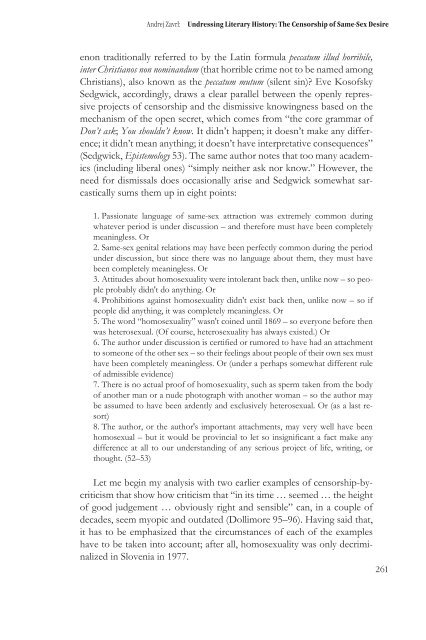Literatura in cenzura - Društvo za primerjalno književnost - ZRC SAZU
Literatura in cenzura - Društvo za primerjalno književnost - ZRC SAZU
Literatura in cenzura - Društvo za primerjalno književnost - ZRC SAZU
- No tags were found...
Create successful ePaper yourself
Turn your PDF publications into a flip-book with our unique Google optimized e-Paper software.
Andrej Zavrl:Undress<strong>in</strong>g Literary History: The Censorship of Same-Sex Desireenon traditionally referred to by the Lat<strong>in</strong> formula peccatum illud horribile,<strong>in</strong>ter Christianos non nom<strong>in</strong>andum (that horrible crime not to be named amongChristians), also known as the peccatum mutum (silent s<strong>in</strong>)? Eve KosofskySedgwick, accord<strong>in</strong>gly, draws a clear parallel between the openly repressiveprojects of censorship and the dismissive know<strong>in</strong>gness based on themechanism of the open secret, which comes from “the core grammar ofDon’t ask; You shouldn’t know. It didn’t happen; it doesn’t make any difference;it didn’t mean anyth<strong>in</strong>g; it doesn’t have <strong>in</strong>terpretative consequences”(Sedgwick, Epistemology 53). The same author notes that too many academics(<strong>in</strong>clud<strong>in</strong>g liberal ones) “simply neither ask nor know.” However, theneed for dismissals does occasionally arise and Sedgwick somewhat sarcasticallysums them up <strong>in</strong> eight po<strong>in</strong>ts:1. Passionate language of same-sex attraction was extremely common dur<strong>in</strong>gwhatever period is under discussion – and therefore must have been completelymean<strong>in</strong>gless. Or2. Same-sex genital relations may have been perfectly common dur<strong>in</strong>g the periodunder discussion, but s<strong>in</strong>ce there was no language about them, they must havebeen completely mean<strong>in</strong>gless. Or3. Attitudes about homosexuality were <strong>in</strong>tolerant back then, unlike now – so peopleprobably didn't do anyth<strong>in</strong>g. Or4. Prohibitions aga<strong>in</strong>st homosexuality didn't exist back then, unlike now – so ifpeople did anyth<strong>in</strong>g, it was completely mean<strong>in</strong>gless. Or5. The word “homosexuality” wasn't co<strong>in</strong>ed until 1869 – so everyone before thenwas heterosexual. (Of course, heterosexuality has always existed.) Or6. The author under discussion is certified or rumored to have had an attachmentto someone of the other sex – so their feel<strong>in</strong>gs about people of their own sex musthave been completely mean<strong>in</strong>gless. Or (under a perhaps somewhat different ruleof admissible evidence)7. There is no actual proof of homosexuality, such as sperm taken from the bodyof another man or a nude photograph with another woman – so the author maybe assumed to have been ardently and exclusively heterosexual. Or (as a last resort)8. The author, or the author's important attachments, may very well have beenhomosexual – but it would be prov<strong>in</strong>cial to let so <strong>in</strong>significant a fact make anydifference at all to our understand<strong>in</strong>g of any serious project of life, writ<strong>in</strong>g, orthought. (52–53)Let me beg<strong>in</strong> my analysis with two earlier examples of censorship-bycriticismthat show how criticism that “<strong>in</strong> its time … seemed … the heightof good judgement … obviously right and sensible” can, <strong>in</strong> a couple ofdecades, seem myopic and outdated (Dollimore 95–96). Hav<strong>in</strong>g said that,it has to be emphasized that the circumstances of each of the exampleshave to be taken <strong>in</strong>to account; after all, homosexuality was only decrim<strong>in</strong>alized<strong>in</strong> Slovenia <strong>in</strong> 1977.261
















